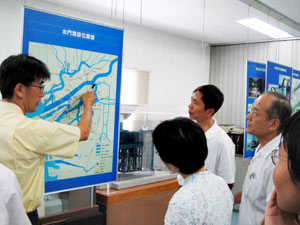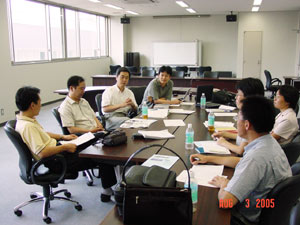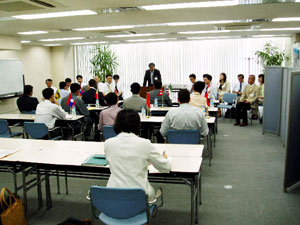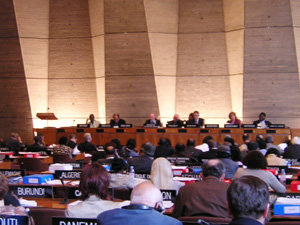
Issue No.7 October
2005In
this seventh issue of our
periodical newsletter we continue our focus on providing our national and
international partners and colleagues with up-to-date information on the progress
of the preparatory work toward the establishment of the centre in the fiscal year
2005. |
| --What's
in this issue-- - Message
from the Director of the Secretariat
- Recent Topics
i. Delegates from the China Institute of Water Resources and Hydropower Research
(IWHR)
ii. Changjiang River Water Management Seminar
iii. The Japan-Korea-China
Academic Session
iv. Training Course on Rivers and Dams Engineering III
has Started
v. Report of the Result of UNESCO General Meeting in Paris -
Research Activities
i. Technical Report on Global Trends
of Water-related Disasters - Reports on Recent Conferences
Attended
i. Second Southeast Asia Forum
ii. International workshop
related to Risk Management toward Millennium Development Goal and Evaluation of
the Social and Economical Impact of Typhoon-related Disasters
iii. The 31st
congress of the International Association of Hydraulic Engineering and Research - Information
|
1. Message from the Director of the SecretariatIn
August 29, Hurricane Katrina directly hit the US coastlines of the Gulf of Mexico
and caused tremendous damage to a number of areas in southern states. In particular,
the Gulf Coast along the states of Alabama and Louisiana was extremely devastated
by record storm surges. A large part of the city of New Orleans, Louisiana, was
flooded and submerged for weeks. Considering that population and asset are concentrated
in low-laying areas around the lower reaches of rivers also in our country, these
extraordinary natural phenomena reminded us how vicious natural power can be and
how important it is to usually prepare for this kind of events. From
October 2 through 7, as an expert in storm surge protection, Mr. Tanaka, Principal
Research Engineer of the Secretariat, joined an assessment team organized by the
American Society of Civil Engineers (ASCE). The aim of the team was to make onsite
visual observations of the levee breaches and to investigate the actual disaster
situation in New Orleans that resulted from Hurricanes Katrina and Rita. He learned
that city functions had not fully restored even more than a month after the hurricane.
He also actually saw a large ship still left on the top of a surge-protection
levee. Those experiences made him feel a real sense of destructive power of the
storm surges. Apart from the hurricane issues,
the 33rd session of the UNESCO General Conference was held at the UNESCO Headquarters
in Paris from October 3 to 21. At this session, the Japanese government's proposal
to the establishment of ICHARM was approved by 191 UNESCO member countries in
the 3rd Meeting on October 12, and finally in the Plenary session on October 19.
It was just two years after the official announcement of the ICHARM plan at the
32nd session in 2003. Following the approval in a cabinet meeting of the Japanese
government, an agreement has to be made between the government and UNESCO; at
the same time, a contract is to be concluded between PWRI and UNESCO. After all
those processes are done, ICHARM would be officially set up as a part of PWRI. In
advance of the official establishment of ICHARM, the new ICHARM building was completed
this past September, and the Secretariat's staff moved in to the second floor
of the building. The construction started August 2004 by remodeling a laboratory
building located just adjacent to the north side of the PWRI main building. In
November 7, the 2nd "Flood Hazard Mapping" training course, in which
a total of 16 engineers from 8 Asian countries will participate this year, will
start by using seminar room in the new building. In
our new office, we renew our determination and promote the preparatory activities
toward the official establishment of ICHARM.
Akira
TWRAKAWA
Director of the Secretariat

| |
2.
Recent Topics i. Delegates from the China Institute of Water
Resources and Hydropower Research (IWHR)
Under the research cooperation agreement between PWRI and the China Institute
of Water Resources and Hydropower Research (IWHR), PWRI arranged a field survey
for four delegates from IWHR and the National Flood Relief and Drought Release
Headquarters Office from July 28 to August 6, 2005. The main purpose of their
field survey was to learn about the current river bank improvement scheme in Japan.
Thus, first they went to the middle to lower reaches of the Yodo River, which
is the second largest river in Japan and saw the super-levee project along the
river. Second, they went to see the underground river at the Tsurumi green lung,
which is located at the center of Osaka City. After
the field survey, they also had an opportunity to exchange views on flood damage
mitigation measures with some members of ICHARM. Most of the time was spent discussing
the applicability of the surper-levee to China. The discussion covered a broad
range of topics concerning the applicability, but in the end we all agreed that
the first step to implement the super-levee project in China was to make a close
examination of such various issues as investible funds and differences in social
institutions between China and Japan. We hope
that we will hold this kind of meeting more frequently, and through the exchange
of different views, we expect experts of each country to accumulate insightful
knowledge of our expertise. |
 Field survey
Field survey |  Discussion
Discussion |
iv.
The Japan-Korea-China Academic Session  This
year's opening ceremony of the training course, "Rivers and Dams Engineering
III" was held on August 22 at the Infrastructure Development Institute (IDI).
The duration of this training course is three and half months. In developing countries,
the mitigation of flood damage caused by typhoons or tropical cyclones and the
water resources development in arid zones are important and indispensable issues
for the stability and improvement of industry, economy and living standards. Thus
the purpose of this course is to respond to the needs of technology transfer from
developed countries to help the construction of administrative systems and technology
development in developing countries. Started in 1969, this training course has
a long history, and the content of the course has since experienced many revisions
according to the current needs. The present training course, titled "Rivers
and Dams Engineering III," started in 2003. Eleven people from ten countries
(Indonesia, Iran, Kenya, Laos, Myanmar, Nepal, the Philippines, Sri Lanka, Syria,
Vietnam) are the participants of this year's training course. This
year's opening ceremony of the training course, "Rivers and Dams Engineering
III" was held on August 22 at the Infrastructure Development Institute (IDI).
The duration of this training course is three and half months. In developing countries,
the mitigation of flood damage caused by typhoons or tropical cyclones and the
water resources development in arid zones are important and indispensable issues
for the stability and improvement of industry, economy and living standards. Thus
the purpose of this course is to respond to the needs of technology transfer from
developed countries to help the construction of administrative systems and technology
development in developing countries. Started in 1969, this training course has
a long history, and the content of the course has since experienced many revisions
according to the current needs. The present training course, titled "Rivers
and Dams Engineering III," started in 2003. Eleven people from ten countries
(Indonesia, Iran, Kenya, Laos, Myanmar, Nepal, the Philippines, Sri Lanka, Syria,
Vietnam) are the participants of this year's training course. v.
The 33rd session of the UNESCO General Conference The
33rd session of the UNESCO General Conference was held at the UNESCO Headquarters
in Paris from October 3 to 21. The General Conference is held biannually and is
the place for decision-making by all 191 UNESCO member countries. PWRI dispatched
Dr. Sakamoto, Chief Executive, Mr. Takahashi, Director of the General Affairs,
and Mr. Terakawa, Director of the Secretariat, to the conference. In October 12,
the Japanese government's proposal for the establishment of ICHARM was approved
in the 3rd Meeting and finally in the Plenary Session on October 19. In advance
of the voting, Mr. Erdelen, Assistant Director General for Natural Science, briefed
the member countries on the key points of the ICHARM proposal and the result of
the feasibility study. Then, on behalf of the Japanese delegation, Mr. Imasato,
Envoy of the Japanese Representative Office to UNESCO, asked the member countries
for support and cooperation, explaining the significance of the establishment
of ICHARM and its planned activities. Approximately 20 representatives voiced
their support for the establishment of ICHARM one after another. They similarly
stated their high appreciation of Japan's international contribution based on
the experience, technology and knowledge that have been accumulated over the long
period of time in our country. Also, they requested that ICHARM's activities are
to be in close cooperation with the existing centers and the efforts initiated
by other countries. Hearing the words "ICHARM" and "Tsukuba"
in their speech over and over, the members of the Japanese delegation felt relieved
and weighty responsibility that they must fulfill. In this 33rd session of the
General Conference, four more centres gained approval for their establishment
as category-2 water-related centres under the auspices of UNESCO in addition to
ICHARM: The
33rd session of the UNESCO General Conference was held at the UNESCO Headquarters
in Paris from October 3 to 21. The General Conference is held biannually and is
the place for decision-making by all 191 UNESCO member countries. PWRI dispatched
Dr. Sakamoto, Chief Executive, Mr. Takahashi, Director of the General Affairs,
and Mr. Terakawa, Director of the Secretariat, to the conference. In October 12,
the Japanese government's proposal for the establishment of ICHARM was approved
in the 3rd Meeting and finally in the Plenary Session on October 19. In advance
of the voting, Mr. Erdelen, Assistant Director General for Natural Science, briefed
the member countries on the key points of the ICHARM proposal and the result of
the feasibility study. Then, on behalf of the Japanese delegation, Mr. Imasato,
Envoy of the Japanese Representative Office to UNESCO, asked the member countries
for support and cooperation, explaining the significance of the establishment
of ICHARM and its planned activities. Approximately 20 representatives voiced
their support for the establishment of ICHARM one after another. They similarly
stated their high appreciation of Japan's international contribution based on
the experience, technology and knowledge that have been accumulated over the long
period of time in our country. Also, they requested that ICHARM's activities are
to be in close cooperation with the existing centers and the efforts initiated
by other countries. Hearing the words "ICHARM" and "Tsukuba"
in their speech over and over, the members of the Japanese delegation felt relieved
and weighty responsibility that they must fulfill. In this 33rd session of the
General Conference, four more centres gained approval for their establishment
as category-2 water-related centres under the auspices of UNESCO in addition to
ICHARM:
The IHP-HELP Centre for Water Law,
Policy and Science (Dundee, United Kingdom) [proposed by the government of the
United Kingdom] The European Regional Centre for Ecohydrology (Lodz, Poland) [proposed
by the government of Poland] The Regional Water Centre for Arid and Semi-Arid
Zones of Latin America and the Caribbean (La Serena, Chile) [proposed by the government
of Chile] The South American Regional Centre on Urban Water Management (Cali,
Colombia) [proposed by the government of Colombia] Adding those new centres to
the existing eight, a total of 13 centres will be in operation as international
or regional centers. These centres are going to structure a global network together,
which, in turn, will give great significance and benefit back to each centre. In
October 11, the 3rd Meeting was held and vigorously discussed strategies for the
establishment of a global tsunami early warning system. In the wake of the devastation
by the Indian Ocean Tsunami at the end of last year, UNESCO's Intergovernmental
Oceanographic Commission (IOC) has taken the initiative in promoting this idea
in cooperation with relevant international agencies such as the World Meteorological
Organization (WMO) and the International Strategy for Disaster Reduction (ISDR).
The member countries, including in-land states which are not surrounded by waters,
showed strong support for the plan, emphasizing the necessity of an early warning
system for mitigating damage by ocean-related disasters like the one by tsunamis.
The Meeting agreed that the organizations concerned continuously work together
to promote the implementation of the plan, which would be reported two years later
in the 34th session of the General Conference. Another
piece of great news was the overwhelming re-election of Mr. Matsuura as Director-General
of UNESCO. He received 151 votes in favor of his appointment out of 154 validly
cast votes. He was first elected in 1999 as the first Japanese Director-General
of UNESCO, and will continue to serve for four more years.
|
3. Research Activities i. Technical Report
on Global Trends of Water-related Disasters
Dr. Tarek Merabtene, Researcher,
Risk Management Research Team
The increasing trends of negative socio-economic impacts worldwide affirm that
there is a shortage of effective disaster preparedness and mitigation methods.
The development of strategic processes for water hazards mitigation requires a
solid base of a concrete assessment and understanding of the risk levels that
our societies are facing. Under our current preparatory activities for the establishment
of the International Centre for Water Hazard and Risk Management (ICHARM) under
the auspices of UNESCO, research on flood risk management and policy analysis
for disasters mitigation is underway. This research is also part of our active
collaboration with UN agencies including the World Meteorological Organization
(WMO) and the United Nations International Strategy for Disaster Reduction (UN-ISDR)
during the progressing preparation of the Second World Water Development Report
(WWDR II) managed by the Secretariat of the United Nations World Water Assessment
Programme (WWAP).
During the first phase of
our assessment, we have produced a comprehensive technical report on the global
and regional trends of water-related disasters and their social impacts with the
ultimate objective of developing our understanding of future requirements to build
standardized indicators to assist in the identification of underlying risks from
water-related disasters, perform policy analysis and evaluate the effectiveness
of adopted measures in water hazard mitigation. The assessment processed in this
study is based on the Emergency Disaster Database (EMDAT), developed and maintained
by the World Health Organization (WHO) Centre for Research on Epidemiology of
Disasters (CRED) of the University of Louvain, Belgium. The results presented
in graphics and tabular forms for each type of water-related disasters allow the
reader to evaluate the current state of the global and regional trends often selected
as valuable indicators to assess our progress in disasters mitigation. The outcome
of the report also put emphasis on numbers of emerging issues and challenges for
the concrete evaluation of social and economic vulnerabilities to water-related
disasters. The findings introduced in this study were presented in front of the
UN Expert Group on Risk Management led by WMO and UN-ISDR (of which PWRI as a
member) for consideration during the production of the 2nd Edition of the World
Water Development Report (WWDR II) managed by the Secretariat of the UN-World
Water Assessment Programme (UN-WWAP) hosted by UNESCO. | |
4. Reports on Recent Conferences Attended i. Second Southeast
Asia Water Forum Second Southeast Asia
Water Forum: Better Water Management Through Public Participation was held on
August 19-September 3, 2005, at Nusa Dua, Bali, Indonesia. Mr.
Junichi Yoshitani participated and made a presentation, "Issues of Public
Decision on Flood Risk Reduction" at Theme 2, Session 4: Reducing Vulnerability
from Floods, Droughts and Other Water-related Natural Disasters. His intention
was to encourage water-related groups to take a look at the reality of an extremely
difficult public decision making when interests conflict. Based on his experience
as a hydrologist sitting on a podium in a series of public meetings, the presentation
highlighted the reality of public participation.
ii. International workshop related to Risk Management toward Millennium Development
Goal and Evaluation of the Social and Economical Impact of Typhoon-related Disasters
 An
international workshop was held by the ESCAP/WMO Typhoon Committee (TC) in Kuala
Lumpur, Malaysia on September 5 - 8. Mr. Fukami, chief researcher, and Mr. Kuribayashi,
researcher, both from the International Centre for Water Hazard and Risk Management,
attended the workshop to make presentations. An
international workshop was held by the ESCAP/WMO Typhoon Committee (TC) in Kuala
Lumpur, Malaysia on September 5 - 8. Mr. Fukami, chief researcher, and Mr. Kuribayashi,
researcher, both from the International Centre for Water Hazard and Risk Management,
attended the workshop to make presentations. Mr.
Fukami made a presentation titled "An Overview of a Flood Forecasting Systems
in Japan", reporting on the present state of a flood forecasting and warning
system based on natural and social conditions in Japan. He also explained about
the latest trend in the development of a radar precipitation synthetic system
and its application to hydrological distributed-parameter models. Other
countries also made presentations on the present development state of flood forecasting
systems, which assured us that flood forecasting systems using IT technologies
are rapidly prevailing in Asia. The next step should be to improve the contents
of the systems, including the availability of input data and the accuracy, reliability
and suitability for needs regarding the products. Mr.
Kuribayashi made a presentation titled "Flood Hazard Mapping Training in
February 2005 at PWRI" and reported on the contents and the achievements
of the first training course. After the presentation, the Typhoon Committee proposed
to extend the duration of the TC's activities on flood hazard mapping until 2008
in order to go along with that of the PWRI's activities. Another plan was proposed
by PWRI to hold an international workshop on flood hazard mapping in collaboration
with TC after the two organizations complete their programs in 2008. In addition,
the representatives from Korea and Thailand highly evaluated the PWRI's training
activities. iii. The 31st congress of the International
Association of Hydraulic Engineering and ResearchThe 31st
congress of the International Association of Hydraulic Engineering and Research,
"Water Engineering for the Future: Choices and Challenges," was held
at a convention center named COEX in Seoul, Korea, from 11th to 16th November
2005. In the special session, "Coping with Risk,"
held on the afternoon of November 16, each country explained about their efforts
in flood risk management while reporting other issues regarding the activities
of the Typhoon Committee. First, Dr. Ti Le-Huu from UNESCAP outlined the Committee.
Then, Mr. Miyake from Japan described the activities of the organization. He is
the vice chairperson of the Committee and also a division head of the Water Resources
Environment Technology Center of Japan. Other presentations were made by Korea,
Malaysia, Japan and Switzerland. As a representative of Japan, Mr. Tanaka delivered
a presentation entitled "Summary of Training Course on 'Flood Hazard Mapping,'"
explaining the outline of the training course. |
6.
Information Training Course: "Flood
Hazard Mapping" During the period from
November 7 to December 2, 2005, ICHARM will hold the "Flood Hazard Mapping"
training course in cooperation with the Japan International Cooperation Agency
(JICA). This training course started in January, fiscal 2004. This year, the course
starts about 2 months earlier, which is November, fiscal 2005, and the duration
of the course is a week longer. The training course has been significantly improved
in quality and quantity. Participants of the training course are two each from
eight countries in East and Southeast Asia. >>"Flood
Hazard Mapping" training course in February 2005 |
Information:This newsletter is distributed
via e-mail. It can also be downloaded from PWRI's website. Those of you who wish
to subscribe or unsubscribe to our mailing list, please contact us by e-mail.
We welcome any comments or requests from you, via e-mail, for making this newsletter
more effective and informative one. Issued by: Secretariat
for Preparatory Activities of UNESCO-PWRI Centre, Public
Works Research Institute (PWRI)
1-6 Minamihara Tsukuba Ibaraki
305-8516, Japan
Tel : +81-29-879-6809 Fax : +81-29-879-6709
E-mail:
whrm@pwri.go.jp
URL: http://www.unesco.pwri.go.jp/ |
| | |





